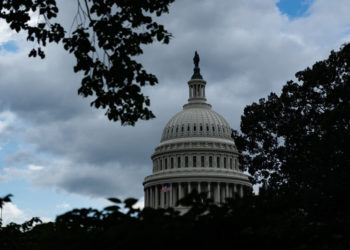BERLIN — The European Commission’s plan to supercharge the continent’s defense industry through a new joint funding tool may violate EU treaties, according to a legal analysis by Germany’s parliament obtained by POLITICO.
The confidential report, dated April 30, by the Bundestag’s legal analysts adds that the EU’s €150 billion Security Action For Europe loans-for-weapons regulation may also deliver limited economic value.
“In the context of the establishment of SAFE, questions also arise concerning the compatibility of this instrument with the Union law prohibition on the use of EU funds for operational measures with military or defense implications,” the analysis states, referencing Article 41(2) of the Treaty on European Union.
SAFE would offer long-term EU-backed loans — up to 45 years, with a 10-year grace period — to member states for defense procurement and industrial projects. It is being advanced under Article 122 of the EU treaties, typically used for economic emergencies.
But the Bundestag report notes this legal workaround “is not universally accepted,” and warns that “even the financing of defense-related goods and services” could fall under the treaty ban — especially when “intended for Ukraine and not for EU member states.”
SAFE was approved last month by member countries, including Germany. The parliamentary report is unlikely to have an impact on German government policy.
The German defense ministry did not immediately reply to a request for comment.
The report’s criticism goes beyond legal concerns. The authors, made up of legal and policy experts, raise doubts about SAFE’s economic impact, pointing to “estimated expenditure multipliers between 0.4 and 1.0” — lower than for other public investments like infrastructure or education.
They caution that “a significant portion of the positive effects of increased defense spending may occur abroad, particularly in the USA,” depending on supplier location.
SAFE’s design includes a “Buy European” clause allowing only 35 percent of the value of the weapons to come from manufacturers beyond the EU, Ukraine or European Free Trade Association countries. While intended to strengthen the European defense base, the report highlights internal EU divisions and risks to defense partners.
“Member states have expressed differing views on whether countries such as Canada or the United Kingdom … should be allowed to participate on an equal footing,” it notes. “Turkey and Serbia … are not mentioned at all.”
SAFE is open to EU and EFTA countries and Ukraine. EU applicants and countries, like the U.K., that have signed security pacts with the bloc can join common procurements. Canadian Prime Minister Mark Carney is in Brussels on Monday to sign a similar deal. However, as the U.K. is now finding out, it’s not clear what level of access third countries will have.
The German legal service does not call for scrapping the initiative, but its tone suggests SAFE is far from settled policy. Its conclusion: “The macroeconomic and industrial policy effectiveness of such investments therefore depends strongly on their localization.”
The post Flagship EU defense plan may be illegal, German parliamentary report warns appeared first on Politico.




